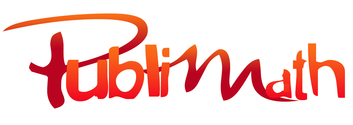L’implication mathématique : étude épistémologique et didactique.
Etude sous trois points de vue : raisonnement déductif, logique formelle et théorie des ensembles. Construction d'une situation didactique qui problématise l'implication.
Auteur : Deloustal-Jorrand Virginie
Résumé
L’implication est un concept omniprésent en mathématiques, puisque constitutif des preuves. Pourtant, l’implication, souvent identifiée à l’objet de la logique naturelle, n’est presque pas enseignée en tant qu’objet mathématique. Elle apparaît comme un objet /transparent/ et facile à manipuler alors que de nombreux étudiants manifestent des difficultés qui lui sont reliées jusqu’en fin d’université. En réponse à la première question, l’auteur présente dans le premier chapitre une analyse épistémologique de l’implication mathématique dans trois cadres : logique formelle, théorie des ensembles et raisonnement déductif. En réponse à la deuxième question, est étudié, au chapitre 2, la « vie » de l’implication, relativement à ces trois cadres, dans quelques manuels du collège à l’université. Au chapitre 3, sont présentés les premiers résultats concernant notamment la « conception causale-temporelle » de l’implication, à la suite desquels, l’auteur a formulé sa thèse : Abstract The implication is an omnipresent concept in mathematics, constitutive of proofs. However, the implication, often identified with the object of natural logic, is almost never taught as a mathematical object. It appears as a clear and easy object whereas many students have difficult ties related to this concept until the end of the university. For this study we tried to answer the following questions: – what is the mathematical object « implication »? – What is its « life » in french teaching? – How can we build a didactical situation that question the implication? To answer the first question, we present, in chapter 1, an epistemological and didactical analysis of the mathematical implication from three points of view: formal logic sets theory and deductive reasoning. to answer the second one, we studied. ln chapter 2, the « life » of the implication, seen from these three points of view, in some schoolbooks from high school to university. In chapter 3, we present our first results, particular y, what we call the « causal-temporal conception » of the implication. following these results, we formula ted our thesis: « it is necessary and sufficient to know and establish links between these three points of view on the implication for a good apprehension and a correct use of it. » to support our thesis we bull at didactical engineering, presented in the second part, which allows to question the implication by an « interplay » between these three points of view. This engineering shows, particularly, the relevance of the sets point of view to study the implication.
Pour cette étude l’auteur s’est posé les question suivantes :
– Quel est l’objet mathématique « implication » ?
– Quelle est sa « vie » dans l’enseignement ?
– Comment construire une situation didactique qui problématise l’implication ?
« Il est nécessaire de connaître et d’établir un jeu dialectique entre les trois cadres, raisonnement déductif, logique formelle et théorie des ensembles pour une bonne appréhension et une bonne utilisation de l’implication. L’auteur soutient que cette condition sur le jeu de cadre est aussi suffisante. »
Pour apporter des éléments de réponse à cette thèse une ingénierie didactique, destinée à des PLC2, a été construite. Elle qui permet de problématiser l’implication par un /jeu/ sur ces trois cadres. En particulier, la pertinence du point de vue ensembliste pour travailler l’implication est montrée. La présentation de cette ingénierie est l’objet de la deuxième partie de la thèse.
Notes
Une version texte intégral est en téléchargement sur le site http://mathsamodeler.ujf-grenoble.fr/
Données de publication
Éditeur Laboratoire Leibniz Université Joseph Fourier Grenoble , 2004 Format A4, 319 p. Index Bibliogr. p. 313-316
Public visé chercheur, enseignant, formateur Niveau 1re, 2de, 3e, collège, lycée, terminale Âge 14, 15, 16, 17
Type thèse Didactique des mathématiques, Grenoble, 2004 Langue français Support papier
Classification
Mots-clés
